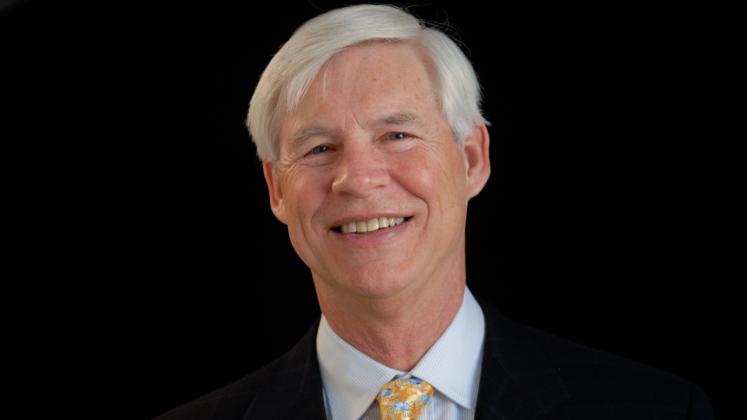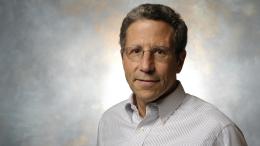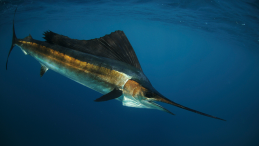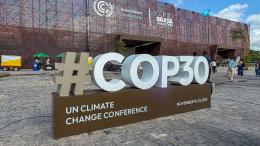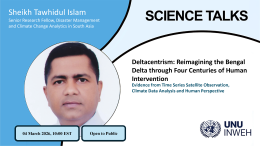On 04 March 2024, the United Nations University, in partnership with the International Peace Foundation, will host "A Financial Approach to Climate Risk”, a public lecture by Robert F. Engle III, Nobel Laureate in Economic Sciences, and Professor Emeritus of Finance at New York University’s Stern School of Business. The event will start at 14:00 in U Thant International Conference Hall at the United Nations University in Tokyo.
This special lecture is part of the JAPAN-ASEAN BRIDGES Event Series, commemorating the 50th anniversary of official relations between Japan and the ASEAN region.
Professor Robert F. Engle received the Nobel Memorial Prize in Economic Sciences in 2003 for the development of methods for analyzing economic time series with time-varying volatility (ARCH models). His contributions were particularly relevant to understanding risk management and financial market behaviour.
Climate change represents one of the greatest risks for humanity. In the face of this challenge, governments, corporations and individuals actively seek innovative solutions to safeguard our planet and the future. Professor Engle’s lecture will delve into the nature of risks associated with climate change — physical risks such as extreme weather events, and transition risks such as policies that move towards renewable energy — and explore their implications for diverse sectors such as banking, insurance and regulatory bodies.
Recognizing the necessity of global cooperation to fight climate change, Professor Engle will also explore the role of the Paris Agreement and its net-zero emissions commitment, focusing on how this international accord serves as both a beacon of hope and a complex challenge, emphasizing the importance of global collaboration to meet our climate objectives.
You are encouraged to participate in a question-and-answer session, which will follow Prof. Engle's lecture.
This event will be held in English with simultaneous interpretation in Japanese. Advance registration (by 3 March) is required. Please click on the REGISTER button above to access the online registration page.
Please note that entry into the venue will not be allowed after 14:15. Please be prepared to present identification at check-in.
About the speaker
Professor Robert Fry Engle III is a 2003 Nobel Laureate in Economics and Professor Emeritus of Finance at New York University's (NYU) Stern School of Business. A member of the National Academy of Science and the Advisory Board of the International Peace Foundation, he is also the Co-Director of the NYU Stern Volatility and Risk Institute and a co-founding president of the Society for Financial Econometrics (SoFiE), a global non-profit organization housed at NYU.
Robert Engle graduated from Williams College with a BS in Physics. He earned an MS in Physics and a PhD in Economics from Cornell University in 1966 and 1969, respectively. After completing his PhD, Robert Engle became Professor of Economics at the Massachusetts Institute of Technology from 1969 to 1975. He joined the faculty of the University of California at San Diego (UCSD) in 1975, where he became a professor in 1977 and later the chair of economics, now holding the positions of Professor Emeritus and Research Professor at UCSD. He has also held associate editorships in several academic journals, notably the Journal of Applied Econometrics of which he was co-editor.
In 2003, Professor Engle shared the Nobel Memorial Prize in Economic Sciences with Professor Clive W. J. Granger from UCSD for developing "methods for analyzing economic time series with time-varying volatility". He conducted much of his prizewinning work in the 1970s and 1980s, when he developed improved mathematical techniques for the evaluation and more accurate forecasting of risk, enabling researchers to test if and how volatility in one period was related to volatility in another. This work had relevance in financial market analysis in which the investment returns of an asset were assessed against its risks and in which stock prices and returns could exhibit extreme volatility.
While periods of strong turbulence caused large price fluctuations in stock markets, these were often followed by relative calm and slight fluctuations. Inherent in Professor Engle's autoregressive conditional heteroskedasticity (known as ARCH) model approach was the concept that, while most volatility is embedded in the random error, its variance depends on previously realized random errors, with large errors being followed by large errors and small by small. This contrasted with earlier models wherein the random error was assumed to be constant over time.
Professor Engle's methods and the ARCH model led to many stock analysis tools and enabled economists to make more accurate forecasts. Robert Engle developed new statistical models of volatility that captured the tendency of stock prices and other financial variables to move between high volatility and low volatility periods. His ARCH model and its generalizations have become indispensable tools for researchers and analysts of financial markets who use them in asset pricing and evaluating portfolio risk. Many of these methods are now featured in the innovative public website V-LAB, where daily estimates of volatilities and correlations for more than a thousand assets can be found.
While Professor Engle's work in financial econometrics covers equities, interest rates, exchange rates and option pricing, he is currently developing methods to analyze large systems of assets, real-time volatility, market microstructure and extreme market movement, and his long-standing interest continues to be in the analysis of financial markets. Professor Engle has published more than 100 academic papers and authored four books. His research has also produced such innovative statistical methods as co-integration, standard features, autoregressive conditional duration (ACD), CAViaR and dynamic conditional correlation (DCC) models.


